Most restaurant staffs share tips. This means when you sign the credit card slip to reward your excellent server—let’s call him Darrell—that $50 you’re leaving doesn’t go directly into his pocket. In fact, Darrell only takes home a fraction of it. In a majority of restaurants, gratuities are consolidated into a common “pool”—a pool that usually has a lot of people who need to get paid swimming in it. Though your server may be the public face of everything that goes on at your table, the work involved in delivering seamless service is a team effort.
You might not notice the quiet infantry of food runners shepherding your plates from the kitchen to the table or the agile crew of buspersons swooping in to harvest dirty dishes and keep your table unencumbered by crumbs. Your cocktails sure as hell aren’t going to make themselves, so of course the bartender gets a piece of the action for that delicious martini he transferred to your dinner bill. He usually also needs a barback to help restock the bar—like a single parent with another hungry mouth to feed. Hostesses or maitrés’d, though they often are not directly involved with table service and rarely receive tips, may also be awarded a cut. In fine dining, a sommelier—whose presence is justified by stimulating wine sales—is necessary, and of course so is forfeiting a healthy chunk of gratuities in exchange for his salesmanship. Every one of these roles described here is essential to your experience and, to varying degrees, everyone’s pay is determined by the tip you choose to leave.
So, consider that $50 tip you left Darrell. Most likely, twenty percent will be divided among the bussers and another twenty percent for the food runners—that’s $10 each off the top. The bartender and wine steward will take ten percent apiece, so there goes another $10. In some restaurants, the hostess or maitre’d will take $5 more bringing the tip-out total to $35 which leaves poor Darrell with a whopping $15 in his pocket—less than a third of your total tip. Oh… and unless you tipped cash don’t forget the three percent service charge levied by the credit card companies that the restaurant often conveniently passes along to Darrell. Whatever is left at this point will be paid on a check at the end of the week where Uncle Sam will be tipped out at least another twenty-five percent in the form of whatever federal, state, local and social security taxes may apply. So that $50 tip turns out to be about $10 of take-home pay. If even. Considering Darrell just spent the last two hours accommodating your obscure requests and enduring your abuse, ten measly bucks isn’t much of a reward.
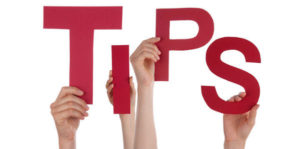 Restaurant managers want their staff to make more money. After all, their employees work on a commission of sales so, in theory, it’s a goose-gander relationship. If tipped employees aren’t making enough money just put less people on the floor, right? Actually, it’s not really that simple. Running with a skeleton crew might please the staff but often at the expense of service when it stretches everyone too thin. As diners become more savvy, restaurants can ill afford slippage in their standards of service. So if staffing less is impractical, restaurants are forced into a form of gerrymandering—redistricting the floor plan to expand individual waiter’s stations while adding more support staff to handle the grunt work. The pie is the same size, it’s just sliced differently—more smaller slices and fewer bigger ones. Restaurants that struggle to find and retain FOH more often experience high turnover due to overstaffing not because of lack of business.
Restaurant managers want their staff to make more money. After all, their employees work on a commission of sales so, in theory, it’s a goose-gander relationship. If tipped employees aren’t making enough money just put less people on the floor, right? Actually, it’s not really that simple. Running with a skeleton crew might please the staff but often at the expense of service when it stretches everyone too thin. As diners become more savvy, restaurants can ill afford slippage in their standards of service. So if staffing less is impractical, restaurants are forced into a form of gerrymandering—redistricting the floor plan to expand individual waiter’s stations while adding more support staff to handle the grunt work. The pie is the same size, it’s just sliced differently—more smaller slices and fewer bigger ones. Restaurants that struggle to find and retain FOH more often experience high turnover due to overstaffing not because of lack of business.
It bears repeating: Just because a restaurant is busy doesn’t mean its front of house staff is making a lot of money. Finding the right formula is very challenging for restaurant managers to maximize the earning potential of its staff and foster an environment conducive to retention. Restaurants that have abolished tipping are facing the same challenges. In order to make a reasonable amount of money, most waiters rely on volume. Using the example above, if Darrell has ten tables throughout the night who all tip $50 each—at $15 take home pay per table—he can walk with $150 in tips. Anything under that is considered a shitty night. Anything over that is gravy. This is why tipping well when service is exemplary makes such a difference. You can be the gravy.

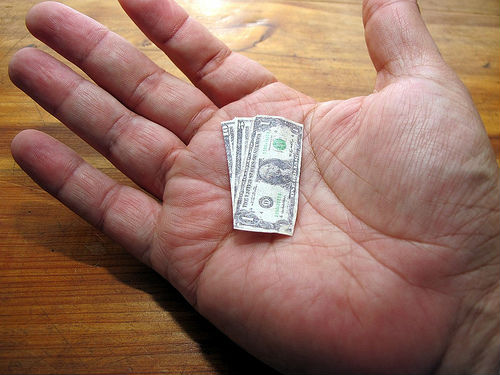
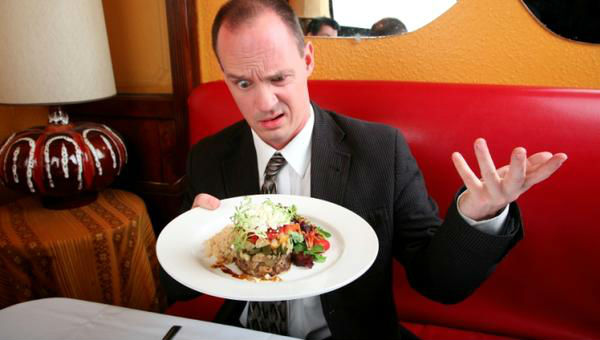
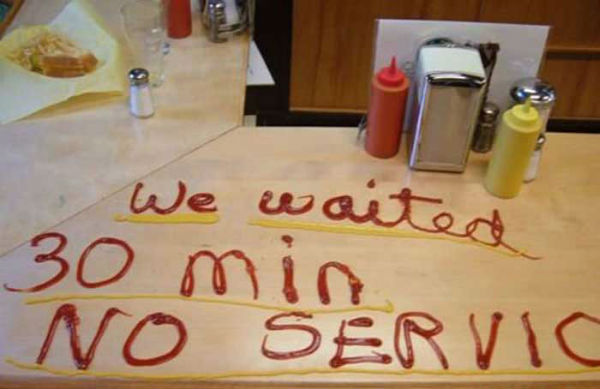 4. Your Waiter Forgot Something –
4. Your Waiter Forgot Something –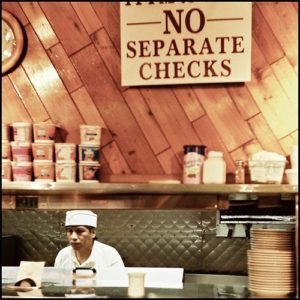 Most waiters cringe when they have tables who immediately request split checks before anyone has ordered a scrap of food. The most common reason people ask for separate checks is because they don’t trust their dining companions to fairly divide up the bill. Guess what? That isn’t your waiter’s problem! Maybe you should find more reliable people to dine out with next time? In busy restaurants, waiters don’t have time to itemize your bill. If you need to divide the bill into separate payments, ask the server to process multiple credit cards for different amounts. But unless you’re splitting payment evenly (which most POS systems are programmed to calculate automatically), you should do the math yourselves. Please spare the waiter your outrage. We both know why you’re getting so upset—because you’re lazy.
Most waiters cringe when they have tables who immediately request split checks before anyone has ordered a scrap of food. The most common reason people ask for separate checks is because they don’t trust their dining companions to fairly divide up the bill. Guess what? That isn’t your waiter’s problem! Maybe you should find more reliable people to dine out with next time? In busy restaurants, waiters don’t have time to itemize your bill. If you need to divide the bill into separate payments, ask the server to process multiple credit cards for different amounts. But unless you’re splitting payment evenly (which most POS systems are programmed to calculate automatically), you should do the math yourselves. Please spare the waiter your outrage. We both know why you’re getting so upset—because you’re lazy.